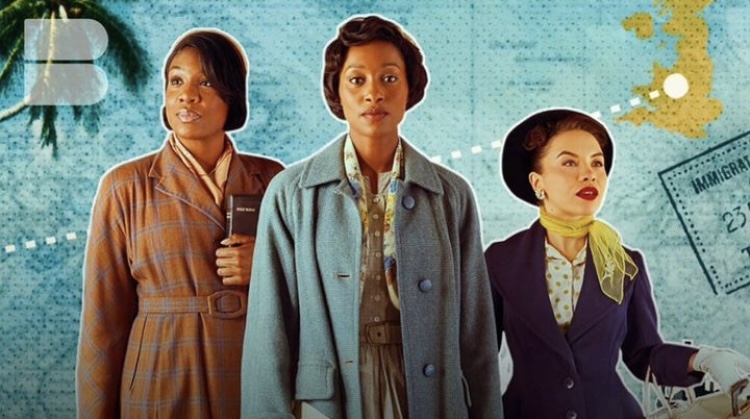
TV Writer Paris Williams applauds Lenny Henry’s impactful depiction of the Windrush generation, seeing her own cultural experiences and knowledge reflected in the show
Lenny Henry’s new ITV drama, Three Little Birds is a masterpiece reflection of the 1950s arrival of thousands of Jamaicans to Britain during the Windrush Era. Henry gained inspiration for the series from his mother’s stories of her experiences of travelling from Jamaica to Britain. His inspiration for this drama reminds me of the journey my grandparents made from Jamaica to Birmingham, the lives they created for our family and the variety of experiences they encountered.
The drama begins with three Jamaican women on board a ship bound for Britain. A sense of idealism and optimism fills the air as the women speak of their aspirations for their new lives in ‘the mother country’. Leah and Chantrelle who are sisters and their friend, Hosanna set sail from Jamaica to London with anticipation and a longing to see family and friends who had already settled in Britain. Leah (Rochelle Neil) travels to Britain to escape marital abuse and violence from her husband, leaving behind three children in Jamaica with her mother until she can “send for them” to live in Britain. Chantrelle (Saffron Coomber) is portrayed as a vibrant, enthusiastic, and confident character who has hopes of becoming an actress. Hosanna (Yazmin Belo) is drawn to Britain on the promise of marriage from Leah’s brother, Aston (Javone Prince). The drama is filled with division, secrets, despair, and contrastingly, a sense of community, love, and sisterhood.
The series accurately captures the stark and grim realities of 1950s Britain, and the racial tensions that were prevalent throughout the era
The series accurately captures the stark and grim realities of 1950s Britain, and the racial tensions that were prevalent throughout the era, contrasting this with the women’s expectations of Britain. Upon arrival, the women are stunned and repulsed by the rejection they receive from their white counterparts, asking, ‘why did they invite us if they did not want us here?’ The visible derogatory placards and signs in many of the scenes stating, ‘no blacks, no Jews and no dogs’, are reflective of the era. Considering this, the women are portrayed as strong, resilient, and optimistic despite the external pressures that are operating around them. Each set their sights on a prosperous future in Britain, which is more difficult to reach than they thought.
The violence, racial prejudice and discrimination endured by them, and many other Jamaican characters are quite unsettling. One scene shows Leah and Shelton being chased by a gang of young white males on a violent rampage . Many other scenes depict the contentious nature of interracial relationships in Britain in the face of societal prejudice. Throughout the drama, it is at times reassuring to see that despite the racial divide, there is also unity in parts, with many welcoming the arrival of Jamaican migrants.
It is clear to see that the comedic nature of Lenny Henry is visible throughout the series, adding a relatable tone to the drama.
Despite this, the drama isn’t all melancholy – it is also reflective of Jamaican humour and patois (slang). While watching the series with my Mom, we often found ourselves finishing the lines of the actors and anticipating what patois they would say in response to something said. It is clear to see that the comedic nature of Lenny Henry is visible throughout the series, adding a relatable tone to the drama. The series is one that many of Jamaican heritage will resonate with, and a provides an opportunity for viewers to gain an insight into the history of Jamaican migration during the post-war era that contributed to the restoration of Britain.
The series is impressive and insightful to see the popular 1950s culture, such as, the jive, boogie-woogie, and the influence of Rock ‘n’ Roll that reflects the era. However, it must be considered that if the series was set in the 1960s or even 1970s, viewers would have seen migrating Jamaicans bringing with them reggae and the development of the popular genre, ska, that impacted British culture immensely, especially in London, Birmingham, and Bristol. It also would have been interesting to see the evolution of Jamaican migration throughout the years.
Nonetheless, Three Little Birds is truly impressive and impactful. The engrossing effect of this series makes it disappointing that it is only a six-part drama, however, it sets the standard high for other migration dramas that wish to imitate Henry’s masterpiece.
Rating – 4/5
For more TV articles read here:
Character Spotlight: The Seventh Doctor

Comments